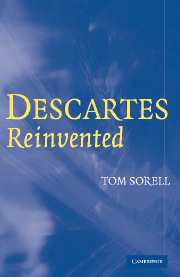Book contents
1 - Radical Doubt, the Rational Self, and Inner Space
Published online by Cambridge University Press: 20 July 2009
Summary
The sweeping doubt of Descartes's First Meditation has unassuming beginnings. First comes the claim that conscious experience includes dreaming and waking experience. Next there is the observation that dreaming and waking experience can sometimes be hard to tell apart. Then dream experience is said to be bad evidence for judgements of what one's current environment is like and for what one is actually doing. From these readily granted points Descartes arrives at the disturbing conclusion that waking experience is, for all we know, no better evidence than dream experience for what one's current environment is like: It is no better because, for all we know, it is dream experience.
This doubt is far-reaching, but it is not total. The Dream is supposed to show that what seems to be waking observation is not necessarily caused by the things apparently seen, heard, or felt. I can seem to see a fire and yet be dreaming, with no fire there; I can seem to be falling to my death from an airplane and in fact be safe in bed. Still, it is one thing to mistake a dream airplane or a dream fire for the real thing; it is another for there to be no such things as fires or airplanes – or bodies in general. A second hypothesis is supposed to call the existence even of those things into question.
- Type
- Chapter
- Information
- Descartes Reinvented , pp. 1 - 31Publisher: Cambridge University PressPrint publication year: 2005



